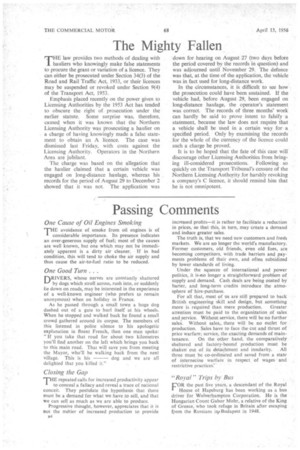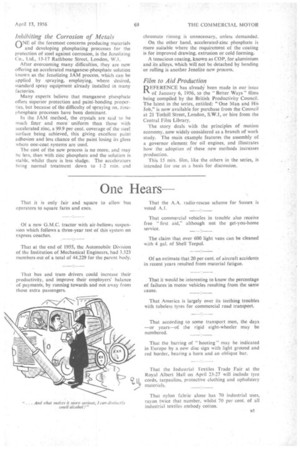Passing Comments
Page 38

Page 39

If you've noticed an error in this article please click here to report it so we can fix it.
One Cause of Oil Engines Smoking
JHE avoidance of smoke from oil engines is of considerable importance. Its presence indicates an over-generous supply of fuel; most of the causes are well known, but one which may not be immediately apparent is a dirty air cleaner. If in bad condition, this will tend to choke the air supply and thus cause the air-to-fuel ratio to be reduced.
One Good Turn . .
DRIVERS, whose nerves are constantly shattered • by dogs which stroll across, rush into, or suddenly lie down on roads, may be interested in the experience of a well-known engineer (who prefers to remain anonymous) when on holiday in France.
As he passed through a small town a huge dog dashed out of a gate to hurl itself at his wheels. When he stopped and walked back he found a small crowd gathered around its corpse. The members of this listened in polite silence to his apologetic explanation in fluent French, then one man spoke: "If you take that road for about two kilometres you'll find another on the left which brings you back to this main road. That will save you from meeting the Mayor, who'll be walking back from the next
village. This is his dog and we are all delighted that you killed it."
Closing the Gap
THE repeated calls for increased productivity appear to conceal a fallacy and reveal a trace of national conceit. They postulate the hypothesis that there must be a demand for what we have to sell, and that we can sell as much as we are able to produce. Progressive thought, however, appreciates that it is not the maier of increased production to provide 54
increased profits—it is rather to facilitate a reduction in prices, so that this, in turn, may create a demand and induce greater sales.
The truth is, that we need new customers and fresh markets. We are no longer the world's manufactory. Former customers, old friends, even old foes, are becoming competitors, with trade barriers and payments problems of their own, and often subsidized by lower standards of living.
Under the squeeze of international and power politics, it is4no longer a straightforward problem of supply and demand. Cash deals are being Misted by barter, and long-term credits introduce the atmosphere of hire-purchase.
For all that, most of us are still prepared to back British engineering skill and design, but something more is required than mere production. Greater attention must be paid to the organization of sales and service. Without service, there will be no further sales. Without sales„ there will be no outlet for production. Sales have to face the cut and thrust of price warfare: service, the exacting demands of main tenance. On the other hand, the comparatively sheltered and factory-bound production must be
shaken out of its detachment and insularity. All three must be co-ordinated and saved from a state of internecine warfare in respect of wages and restrictive practices'
"Royal" Trips by Bus
FOR the past five years, a descendant of the Royal House of Hapsburg has been working as a bus driver for Wolverhampton Corporation. He is the Hungarian Count Gabor Mohr, a relative of the King of Greece, who took refuge in Britain after escaping tram the Russians irv Budapest in l948.
Inhibiting the Corrosion of Metals
nNE of the foremost concerns producing materials and developing phosphatingprocesses for the protection of steel against corrosion, is the Jenolizing Ca, Ltd., 13-17 Rathbone Street, London, W.1.
After overcoming many difficulties, they are now offering an accelerated manganese-phosphate solution known as the Jenolizing JAM process, which can be applied by spraying, employing, where desired, standard spray equipment already installed in many fac to ries.
Many experts believe that manganese phosphate offers superior protection and paint-bonding properties, but because of the difficulty of spraying on, zincphosphate processes have been dominant.
In the JAM method, the crystals are said to he much finer and more uniform than those with accelerated zinc, a 99.9 per cent. coverage of the steel surface being achieved, this giving excellent paint adhesion and less chance of the paint losing its gloss where one-coat systems are used.
The cost of the new process is no more, and may be less, than with zinc phosphate and the solution is stable, whilst there is less sludge: The accelerators bring normal treatment down to 1-2 min. and
chromate rinsing is unnecessary, unless demanded.
On the other hand, accelerated-zinc phosphate is more suitable where the requirement of the coating is for improved drawing, extrusion or cold forming.
A tenacious coating, known as COP, for aluminium and its alloys, which will not be detached by bending or rolling is another Jenolite new process.
Film to Aid Production
REFERENCE has alrearlY been made in our issue of January 6, 1956, to the " Better.Ways " films being compiled by the British Productivity Council. The latest in the series, entitled: "One Man and His Job," is now available for purchase from the Council at 21 Tothill Street, London, S.W.1, or hire from the Central Film Library.
The story deals with the principles of motion economy, now widely considered as a branch of work study. The main example features the assembly of a governor element for oil engines, and illustrates how the adoption of these new methods increases production.
This 15 min. film, like the others in the series, is intended for use as a basis for discussion.




















































































































